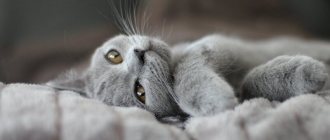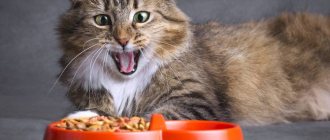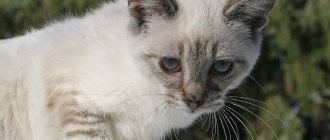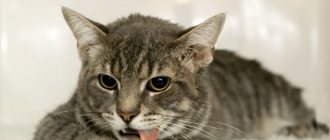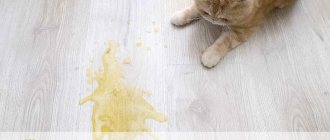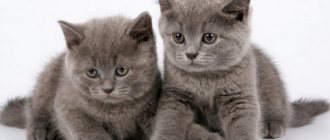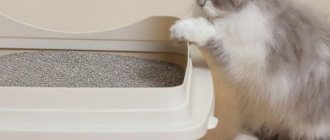Poisoning causes disruption of vital processes in cats and develops when toxic substances, spoiled foods or toxins enter the body. According to statistics, intoxication is most common in cats because they are less selective in food compared to other pets.
Let's take a closer look at what to do if your pet is poisoned and how to help him.
Read in this article:
- How can a cat be poisoned?
- Symptoms of poisoning
- Diagnostics
- Treatment
- We provide first aid
- Contact the veterinarian
- Nutrition rules after poisoning
- Prevention
How can a cat be poisoned?
Cats are very curious animals that love to poke their noses into all sorts of places.
So they explore the world around them, but at the same time expose themselves to danger. About 25% of all possible incidents with cats are poisoning. The causes of poisoning can be different, but most often they are:
- spoiled cat food,
- stale kitchen waste,
- medical drugs,
- indoor and outdoor plants (buttercups, lilies, cornflowers, cyclamen, etc.),
- chemicals (detergents, bleaches, flea and tick gels, etc.),
- pesticide,
- household items (dental floss, tinsel, glitter, etc.).
Many “human” foods can cause poisoning: alcohol, garlic and onions, dough (especially yeast), sweeteners, raisins and grapes.
Symptoms of poisoning
Symptoms of poisoning in cats can vary significantly. It all depends on the amount of toxic substance or spoiled product that has entered the pet’s body.
The most characteristic signs indicating animal poisoning:
- difficulty breathing,
- complete loss of appetite
- severe vomiting
- diarrhea,
- unquenchable thirst,
- copious secretion of saliva,
- unsteady gait with loss of coordination in space,
- dilated pupils,
- trembling of the paws and/or the whole body,
- depressed state.
Note! In particularly severe cases, severe convulsions, foaming at the mouth and coma may occur (for example, from poisoning with rat poison, pesticides and other strong chemicals).
The presence of at least one of the above symptoms requires immediate contact with a veterinary clinic. Only here will a correct diagnosis be made and effective treatment prescribed that will help restore your pet’s health.
Treatment
Try to find out how and what your cat could have been poisoned with. Carefully inspect the room and apartment. Most likely, your pet left behind traces: chewed packs of medications, scattered contents from the table, trash can, etc.
If you manage to find out what poisoned the animal, then take a sample (for example, a pack of tablets) with you to the veterinarian. Additionally, bring a sample of vomit (if available) to quickly obtain laboratory results. Don't ignore this recommendation! In case of particularly severe poisoning, this will allow you to quickly help your pet and save his life.
Contact the veterinarian
All you can do if your cat is poisoned is provide first aid. Otherwise, you need to trust a professional veterinarian who will make an accurate diagnosis and develop a treatment plan.
In cases where the cat has swallowed spoiled food or a toxic substance, gastric lavage is performed. This procedure is carried out under general anesthesia and the mandatory supervision of a veterinarian. At the end of the operation, the remaining poison is absorbed by introducing a mixture of water and activated carbon or other sorbents.
The specialist is working on a maintenance therapy plan. It consists of ensuring optimal breathing, controlling body temperature and restoring water-salt balance. Painkillers and diuretics are prescribed.
If the detected symptoms of poisoning (convulsions, foam at the mouth, incessant vomiting, etc.) indicate severe damage to the gastrointestinal tract, antibiotics are prescribed. Their dosage and time of administration are clearly determined by the veterinarian.
Special poisons
Many cleaning products used in everyday life (fluids for washing sinks and toilets, solvents, etc.) are potent poisons. Poisoning can occur either due to the negligence of the owners or as a result of the pranks of children who doused the cat with such a substance. In such cases, you should not induce vomiting, but give the cat vegetable oil (1-2 tablespoons) and wash the affected areas with baby shampoo.
Flea collars, shampoos and aerosols containing insecticides - organophosphates and carbamates - can pose a danger to cats. The means of controlling cockroaches - various traps - are also dangerous. A cat can become poisoned by deciding to chew on a collar, or by licking insecticide from its fur. The nervous system is primarily affected.
Symptoms: excessive salivation, diarrhea, vomiting, drowsiness, convulsions, convulsions, tremors. In such cases, you need to quickly induce vomiting, give polysorb or activated carbon, rinse the stomach and urgently take the cat to the veterinary clinic. Phospholithin or atropine can be used as antidotes for poisoning with organophosphorus compounds.
Among other household hazards, naphthylthiourea (ratsid) should be highlighted - a cat can be poisoned by either ingesting poisoned bait or eating a poisoned rat or mouse.
The symptoms of such poisoning and first aid for it are the same as for poisoning with insecticides.
In case of arsenic poisoning, some compounds of which are used as pesticides (for example, Parisian greens), death can occur within 2-4 hours, before any symptoms develop. If you suspect arsenic poisoning, induce vomiting and urgently take the affected animal to a veterinary clinic. The antidote for arsenic poisoning (as well as bismuth, mercury, zinc, etc.) is unithiol (10% solution orally, at the rate of 50 mg per kg).
In case of poisoning with barium carbonate (barium carbonate), it is necessary to induce vomiting as quickly as possible. A 1% solution of sodium or magnesium sulfate is used as an antidote.
Take the cat to the veterinary clinic immediately.
In case of poisoning with warfarin (zoocoumarin), an anticoagulant used to control rodents, give the cat vitamin K (Vicasol). The doctor will inject the cat intravenously with gamavit, or a solution of calcium chloride, glucose and ascorbic acid. Sometimes a blood transfusion is used to save an animal.
Many cats like the sweetish taste (most likely not even a taste, but a smell) of antifreeze (ethylene glycol), used as an additive to coolant (antifreeze) and antifreeze fluid in car windshield washers. Antifreeze poisoning is accompanied by vomiting, loss of coordination, weakness, irreversible kidney damage, coma and often death. If a cat drank antifreeze in front of your eyes, you need to induce vomiting as quickly as possible and rinse its stomach. Intravenous administration of wine alcohol and other alcohols is used as an antidote. This is due to the fact that antifreeze itself is not very dangerous for cats, but immediately after it is processed by the liver, one of the resulting metabolites - oxalic acid - kills the cat in a matter of hours. Oxalic acid is not absorbed by the cat's body and is therefore extremely toxic to it. Entering the urinary tract, it literally burns out its individual parts, not to mention the formation of crystals (oxalates) with calcium, which block the urinary tract.
In case of poisoning with zinc phosphide, a zoocide often used to control rats, as well as field mice and other crop pests, immediately rinse the cat’s stomach and induce vomiting, then give Polysorb, saline laxatives. Inject camphor and gamavit subcutaneously (it is better if the doctor administers it intravenously).
Cats can also become poisoned during trips to their dachas, country and foreign trips, by tasting some poisonous plant. In addition, many cats (especially those who are never allowed outside) like to nibble on the leaves of decorative indoor plants. Most often, cats eat grass in order to then, by regurgitating, remove clumps of hair from the stomach, which they usually swallow when licking.
The effects of eating the “wrong” plants can be different: from allergies (allergic dermatitis, swelling of the oral mucosa, bronchitis, rhinitis, gastroenteritis, etc.), digestive disorders (vomiting, diarrhea, abdominal pain), eye and skin irritation to damage to the nervous system (convulsions, impaired coordination of movements, hallucinations) and kidneys (renal failure), and disorders of cardiovascular activity (collapse, heart failure).
Symptoms: profuse salivation, often accompanied by vomiting. Possible depression of respiratory function and disruption of cardiac function.
Treatment: if vomiting does not occur on its own, try to induce it yourself, give a moistened tablet of activated charcoal and contact your veterinarian.
Nutrition rules after poisoning
Once the symptoms of poisoning have resolved, the cat is placed on a 24-hour fasting diet. The main thing is to ensure free access to fresh and clean drinking water during the first day. After the diet, you need to feed your pet 3-4 times a day.
Light meals recommended:
- porridge,
- boiled vegetables,
- special foods: Canidae, InnovaEvo, Orijen, Schesir, Royal Canin.
You can switch the cat to its usual diet 5-7 days after intoxication, provided that the animal’s condition is satisfactory.
Feeding and rehabilitation
Keeping a cat on a fasting diet for more than 24 hours is not recommended. What to do if a day has already passed, but vomiting and diarrhea have not yet stopped? There are several options:
- At home, your cat can be given rice water (the water in which the rice was cooked) or the cereal itself, well boiled and crushed until smooth.
- In a clinical setting, the cat is given IV drips with nutritional and vitamin solutions.
- As a first feeding attempt, you can try special liquid food for weakened animals.
8–10 hours after vomiting and diarrhea have resolved, the cat can be offered warm, low-fat broth. After the cat drinks the broth, you need to monitor its condition for several hours. If the symptoms have not worsened, after a few hours the cat can be offered some boiled meat mixed with boiled rice.
If you feed your cat industrial liquid food for weakened animals, it is better to exclude natural products (except broth). After diarrhea, cats' intestinal walls are very irritated, and a mixed diet can make the situation worse.
With a natural diet, the cat's appetite must be encouraged. The best appetite stimulant is smell. You can try eating with your cat; all animals feel the urge to eat when they see someone else eating. For every piece you eat, no matter how small, generously praise the cat, gently stroke it, and express your joy as clearly as possible. Emotional stimulation is very important for a pet recovering from surgery.
Do not use spices or salt to stimulate your appetite.
If you suspect that food refusal is due to its lackluster odor, it is better to mix the food with commercial cat food for rehabilitation.
Most cats that survive poisoning experience significant weight loss. If your cat is obese and has lost some weight, there is no need to introduce any additional sources of carbohydrates into the diet. If your cat has lost muscle mass and appears weak, the following can be considered as additional sources of energy :
- Cereals – buckwheat, rice. Boil the porridge well and grind it until smooth. Can be cooked in water or broth.
- Broths from oceanic fish varieties. Sometimes veterinarians prescribe fish oil to cats as an immune stimulant, but after diarrhea this measure is not always appropriate.
- Homemade cottage cheese mixed with milk (if the cat is not lactose intolerant) - cottage cheese is made using calcium chloride. If your cat is lactose intolerant, the curds are not squeezed out completely so that they are liquid and diluted with whey.
- Hard unsalted cheese - some cats love cheese very much and eat it even if they don’t feel well. You cannot feed a cat only cheese after poisoning, but using the treat as a stimulus for appetite is quite appropriate.
- Baby food with milk or meat - read the ingredients carefully; it is not advisable for the treat to contain sugar. It is best to avoid eating vegetables and berries during the rehabilitation period after poisoning.
Important nuances of the diet
In the first days after poisoning and throughout the entire rehabilitation period, it is not recommended to give your cat dry food. Granules can scratch the irritated walls of the intestines and stomach, which will lead to a deterioration in the pet’s general condition, the resumption of diarrhea and the inflammatory process.
If your cat is accustomed to industrial food, drying should be replaced with pate, semi-moist canned food or liquid food intended for the recovery of animals after illness.
It is advisable to take all measures to ensure that the cat begins to eat natural food. In parallel with the diet, it is advisable for the pet to undergo a course of medications with probiotics. If your cat drinks homemade yogurt, it is better to stock up on starter culture and give it every day. It is important not to forget about water, which must be constantly available. If your pet is not eating well, you can replace the water with a glucose solution; it has a sweetish taste.
After poisoning, it is important to adhere to the following principles:
- Less, but more often - offer your pet food once every 1-2 hours in small portions (1-1.5 teaspoons).
- Easy to digest - all foods should be easily and quickly digested.
- Attractive aroma – a cat’s appetite depends on how attractive the food smells. You can add commercially canned gravy to natural food if your child is used to the food.
- Food should be fresh, prepared for 1-2 feedings. Try not to cook a lot. A cat’s sense of smell is much sharper than yours; it understands very well whether the product being offered to it is fresh.
- Warm food – cold food has almost no smell, which means it will not be appetizing to the cat.
If your cat categorically refuses to eat for more than 5 hours after diarrhea and vomiting have stopped, be sure to contact your veterinarian.
Do not force-feed your pet without a doctor's prescription, since refusal of food can be associated with severe damage or even perforation of the intestinal walls.
Prevention
Prevention of poisoning in cats begins with controlling the diet. It is not recommended to feed pets from the table, since many foods are dangerous for them. Monitor the freshness of the food: the water should be fresh and the food should not be weathered.
The key to your cat's health is timely care. Carry out hygiene and veterinary procedures, not only at home, but also in professional settings (for example, regularly visit a veterinary clinic for anti-tick treatment).
Ensure complete safety for your pet at home. Do not leave chemicals, medications or cosmetics within reach of your cat, and close all lids tightly. While cleaning the house, we recommend temporarily isolating the animal. Find out whether houseplants pose a potential danger to your pet. The most poisonous of them are: lilies, geraniums, ficus, begonias, etc.
Etiology
Poisoning is a condition when the body is affected by a toxic substance that has entered from the outside or formed inside. Usually the process is lightning fast or acute, but sometimes it becomes chronic and protracted. Many factors can trigger the response.
Causes:
- bad food, dirty water;
- inhalation of fumes from chemicals;
- eating poisonous plants;
- insect, spider, snake bites;
- violations in the dosage of medications.
Nutritional factor is the most common cause. It happens that a pet swallows or inhales herbicides, fertilizers, household chemicals, paints or varnishes. Sometimes the owner overdos the dose of the drug.
